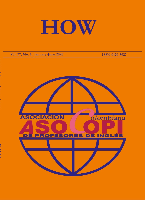
How-A Colombian Journal for Teachers of English
Scope & Guideline
Fostering Innovation in English Language Instruction.
Introduction
Aims and Scopes
- Promoting Innovative Pedagogies:
The journal highlights research on innovative teaching methodologies, such as project-based learning, task-based instruction, and the use of technology in language teaching, aiming to enhance communicative competence among learners. - Addressing Cultural and Emotional Dimensions:
Articles often explore the interplay between culture, identity, and language learning, emphasizing the importance of emotional aspects in teaching practices and learner experiences. - Teacher Development and Professional Growth:
A significant focus is placed on the professional development needs of English language teachers, including their perceptions, identities, and narratives, to foster reflective teaching practices. - Critical and Interdisciplinary Approaches:
The journal encourages critical perspectives on language education, integrating issues of social justice, equity, and identity, thereby contributing to a more holistic view of language teaching in diverse contexts. - Research on Learner Experiences and Needs:
Research articles often examine the experiences and needs of EFL learners in Colombia, providing insights into effective assessment practices, learner motivation, and engagement in language learning.
Trending and Emerging
- Integration of Technology in Language Learning:
Recent publications highlight the increasing use of technology, such as digital tools and online platforms, to enhance language learning experiences and promote learner engagement. - Focus on Emotional Well-being in Language Education:
There is a growing emphasis on addressing emotional aspects of language learning, recognizing the importance of well-being and mental health in the educational process. - Culturally Responsive Teaching:
Emerging themes focus on culturally responsive teaching practices, exploring how cultural contexts influence language learning and teaching, and the importance of integrating local narratives in the curriculum. - Narrative and Reflective Practices:
The journal is increasingly featuring narratives from teachers and learners, promoting reflective practices that encourage deeper understanding of personal and professional identities in language education. - Interdisciplinary Approaches to Language Teaching:
There is a trend towards interdisciplinary research that intersects language education with other fields, such as social justice, gender studies, and identity politics, enriching the discourse around ELT.
Declining or Waning
- Traditional Language Assessment Methods:
There has been a noticeable decrease in articles focusing on conventional language assessment methods, as the journal increasingly prioritizes innovative and learner-centered assessment approaches. - General Language Teaching Methodologies:
The journal has moved away from broad discussions on general language teaching methodologies, instead favoring more specific and contextually relevant teaching practices that address local needs. - Static Views on Language Policy:
Research on static language policies and their implications for ELT has diminished, giving way to more dynamic discussions that consider the evolving nature of language education in a globalized context. - Focus on Non-Critical Pedagogical Approaches:
There is less emphasis on non-critical or traditional pedagogical approaches, as the journal increasingly aligns itself with critical pedagogy, encouraging dialogue around power dynamics and social issues in language education. - Limited Exploration of Non-ELT Subjects:
The exploration of non-ELT subjects in the context of language teaching has waned, as the journal now concentrates more on the intersection of language and culture, identity, and emotional factors in the learning process.
Similar Journals

English Teaching and Learning
Exploring New Horizons in English Teaching MethodologiesEnglish Teaching and Learning is a distinguished academic journal published by SPRINGER SINGAPORE PTE LTD, focusing on the dynamic fields of education and linguistics. With an ISSN of 1023-7267 and an E-ISSN of 2522-8560, this journal serves as a vital platform for researchers, educators, and practitioners interested in advancing the understanding of English language instruction and learning methodologies. Recognized for its high standards, it has achieved a notable Q2 ranking in Education and a prestigious Q1 ranking in Linguistics and Language in 2023, underscoring its impact within these essential scholarly fields. The journal, which spans a converged publication period from 2015 to 2024, endeavors to disseminate innovative research, theoretical insights, and practical applications, making it an invaluable resource for anyone committed to enhancing English education globally. Although it does not operate under an open-access model, its contributions are pivotal in shaping contemporary discourse in English teaching and learning.
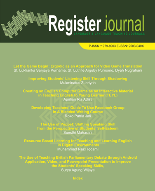
REGISTER Journal
Advancing Islamic scholarship through open dialogue.Welcome to the REGISTER Journal, an esteemed publication in the field of Islamic studies and education, dedicated to advancing knowledge and fostering critical dialogue since its inception. Published by Univ Islam Negeri Salatiga, the journal operates under an Open Access model, empowering researchers, practitioners, and students worldwide with unrestricted access to its scholarly content since 2008. With the ISSN: 1979-8903 and E-ISSN: 2503-040X, REGISTER Journal aims to disseminate innovative research, insightful reviews, and thought-provoking discussions that contribute to the vibrant tapestry of Islamic scholarship. By fostering a collaborative environment for sharing ideas, REGISTER serves as a crucial platform for educators, researchers, and students seeking to deepen their understanding of contemporary issues within the Islamic context. Join us in exploring the intersections of thought, culture, and education in this engaging and dynamic journal.
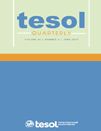
TESOL QUARTERLY
Exploring the Frontiers of TESOL ScholarshipTESOL Quarterly, published by Wiley, is a premier academic journal in the fields of Education and Linguistics, noted for its significant contributions to the study of Teaching English to Speakers of Other Languages. Since its inception in 1981, this journal has established itself as a vital platform for researchers and educators, emphasizing empirical studies, innovative teaching practices, and critical reviews that inform policy and pedagogy. With an impressive impact factor, it consistently ranks in the Q1 Quartile across multiple categories in both Education and Linguistics, highlighting its influence and reach within the scholarly community. The journal boasts strong Scopus rankings, placing it in the top 96th percentile among related publications, further affirming its essential role in disseminating cutting-edge research. Although it does not offer open access, TESOL Quarterly remains dedicated to promoting high-quality scholarship that advances the understanding of language education practices globally.

TESL Canada Journal
Transforming Language Acquisition Through Scholarly ExchangeTESL Canada Journal, published by TESL Canada, serves as a vital resource for researchers, educators, and practitioners in the field of English as a Second Language (ESL) and applied linguistics. With its commitment to advancing scholarship and best practices in language education, this esteemed journal fosters a platform for the dissemination of high-quality research and innovative pedagogical approaches. Although it operates without open access, its comprehensive articles and reviews offer valuable insights into current trends and challenges faced by ESL educators across Canada and internationally. The journal is dedicated to promoting a deeper understanding of language acquisition processes and instructional methodologies, contributing significantly to the professional development of its readership. Located in Burnaby, Canada, the journal aims to bridge the gap between theory and practice, making it an indispensable source for educators and researchers looking to enhance their expertise in ESL education.

Language Learning in Higher Education
Transforming higher education through effective language learning.Language Learning in Higher Education is a prominent academic journal published by DE GRUYTER MOUTON, dedicated to exploring the intricate dynamics of language acquisition and pedagogical practices within the higher education context. With a robust ISSN: 2191-611X and E-ISSN: 2191-6128, this journal provides a platform for innovative research that addresses contemporary challenges and methodologies in language education. The journal enjoys a favorable reputation in the academic community, as evidenced by its ranks in the Scopus database, where it holds a position in the 67th percentile for Language and Linguistics and is classified in the Q3 and Q2 quartiles across relevant education and linguistics categories. Since its convergence in 2017, Language Learning in Higher Education aims to enrich scholarly discourse by publishing high-quality articles that foster insights into effective language learning strategies, thus serving as an essential resource for researchers, educators, and students committed to enhancing language education. The journal's editorial team is devoted to advancing the field through rigorous peer-review processes and welcomes contributions that push the boundaries of language learning research.
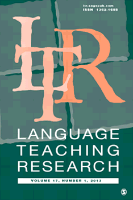
Language Teaching Research
Exploring innovative methodologies in language learning.Language Teaching Research, published by SAGE Publications Ltd, serves as a pivotal platform for scholars and practitioners in the domains of education and linguistics. Since its inception in 1997, this prestigious journal has maintained its status within the Q1 category for both Education and Linguistics, symbolizing its significant impact and commitment to excellence in research. With impressive Scopus rankings placing it among the top percentile in its fields, Language Teaching Research provides a comprehensive array of articles, studies, and reviews dedicated to advancing the theory and practice of language education. Although currently not an Open Access journal, it remains essential reading for those engaged in the evolving challenges and methodologies surrounding language teaching and learning. The journal aims to foster insightful discussions and disseminate innovative research findings, making it a crucial resource for educators, researchers, and students keen on enhancing language acquisition and pedagogical strategies.
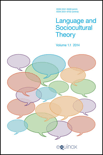
Language and Sociocultural Theory
Decoding the Nuances of Human CommunicationLanguage and Sociocultural Theory, published by EQUINOX PUBLISHING LTD, stands as a vital resource for scholars in the domains of linguistic studies and cultural theory. With its ISSN 2051-9699 and E-ISSN 2051-9702, this UK-based journal has consistently achieved Q1 rankings in both Cultural Studies and Linguistics and Language as of 2023, demonstrating its significant impact within the academic community. The journal's position is further affirmed by its rankings in Scopus, where it occupies the 80th percentile in Cultural Studies and the 72nd percentile in Linguistics and Language, making it a leading platform for cutting-edge research. Though not an Open Access journal, it provides critical insights into the interconnectedness of language and sociocultural dynamics, making it essential reading for researchers, professionals, and students eager to explore the complexities of human communication. Spanning converged years from 2014 to 2023, the journal presents a rich collection of scholarly articles that strive to advance the field and inspire further academic inquiry.
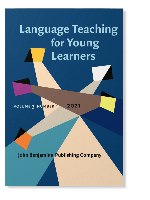
Language Teaching for Young Learners
Shaping the future of language teaching for young learners.Language Teaching for Young Learners, published by John Benjamins Publishing Co, is a premier journal dedicated to enhancing the pedagogy of language acquisition in early childhood education. Since its inception in 2019, it has rapidly established itself within the research community, reflected by its high Scopus rankings—placing it in the 85th percentile for Language and Linguistics and the 84th percentile for Education. The journal aims to provide a platform for innovative research, practical insights, and theoretical discussions surrounding the teaching of languages to young learners, thus contributing significantly to the fields of Education and Linguistics. With an open access model currently unavailable, it caters to a diverse global audience, including researchers, educators, and policy-makers, keen on improving pedagogical practices. Located in the Netherlands, the journal's commitment to academic excellence is evident through its Q1 and Q2 rankings in Linguistics and Language and Education respectively, encouraging continual discourse in cultivating effective language education practices.

GIST-Education and Learning Research Journal
Empowering Educators through Innovative ResearchGIST-Education and Learning Research Journal, published by INST UNIV COLOMBO AMERICANA-UNICA, stands as a prominent vessel for the dissemination of scholarly research in the field of education and learning. Since its inception in 2007, this open access journal has championed the free exchange of knowledge, allowing researchers, educators, and students from around the globe to contribute to and benefit from the latest findings and practices in educational theory and methodology. With its commitment to enhancing educational practices and influencing policy through rigorous research, GIST-Education and Learning Research Journal invites submissions that explore innovative teaching strategies, learning technologies, educational psychology, and related fields. Its accessibility and dedication to quality research make it an invaluable resource for anyone invested in the improvement of educational outcomes.
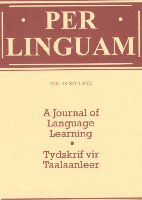
Per Linguam-A Journal of Language Learning
Nurturing Insights for Educators and Learners AlikePer Linguam - A Journal of Language Learning, published by the University of Stellenbosch's Department Didaktiek, is a distinguished open-access journal that has been a vital resource for language educators and researchers since 1985. With an ISSN of 0259-2312 and an E-ISSN of 2224-0012, it fosters scholarly dialogue surrounding language acquisition and pedagogy. Positioned in the Q4 category in Developmental and Educational Psychology and Education, and Q3 in Linguistics and Language for 2023, this journal addresses crucial aspects of language learning that impact both teaching practices and learner outcomes. Although its Scopus rankings reveal challenges, the journal remains committed to its objectives of advancing knowledge and innovation in language education. Operating from Matieland, South Africa, Per Linguam invites contributions that explore the intersections of theory, research, and practical application, offering a platform for educators, students, and policymakers to share insights and strategies that can transform language learning experiences globally.